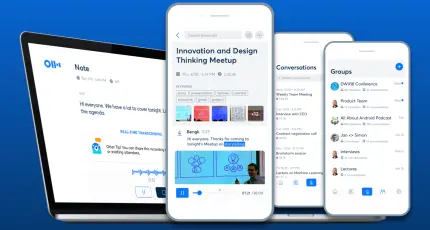Otter.ai
, an AI-powered transcription app and note-takers’ best friend, has received a strategic investment from Japan’s leading mobile operator and new Otter
partner, NTT DOCOMO Inc. The two companies are teaming up to support Otter’s expansion into the Japanese market where DOCOMO will be integrating Otter with its own A.I.-based translation service subsidiary, Mirai Translation, in order to provide accurate English transcripts which are then translated into Japanese.
The investment was made by DOCOMO’s wholly-owned subsidiary, NTT DOCOMO Ventures, Inc., but the size was undisclosed. However, the new round was $10 million in total, we’re told. To date, Otter
has raised
$23 million in funding
from NTT DOCOMO Ventures, Fusion Fund, GGV Capital, DFJ Dragon Fund, Duke University Innovation Fund, Harris Barton Asset Management, Slow Ventures, Horizons Ventures, and others.
Otter launched its service in 2018, offering a way for users to search voice conversations as easily as they can today search their email or their text. Otter CEO and founder Sam Liang, along with a team hailing from Google, Facebook, Nuance, Yahoo as well as Stanford, Duke, MIT, and Cambridge, developed a technology specifically designed to capture conversations — like meetings, interviews, presentations, lectures, and more. This is a different sort of technology that what’s used in today’s voice assistants, like Google Assistant, Siri and Alexa, as it’s focused on transcribing longer, human-to-human conversations, which are spoken naturally.
The product itself creates automated transcriptions in real-time, as speakers are talking. The resulting transcript is searchable, and identifies the different speakers and key phrases. You can also upload photos alongside the recording.
Since launch, Otter has
expanded
its product to millions of users and now offers both an Otter for Teams and enterprise tier.
With the new NTT DOCOMO partnership, the goal is to bring the Otter enterprise collaboration services to the Japanese market, explains Liang, the former Google architect who later sold his location startup
Alohar Mobile
to Alibaba.
“DOCOMO and other large companies have a large international workforce who communicate in English for their international conference calls,” says Liang. “They will use Otter to take automatic meeting notes, and improve meeting and communication effectiveness…The goal is to further enhance communication and collaboration on top of Otter‘s automatic English meeting note services,” he adds.
Otter.ai
has similar partnerships with U.S. businesses, including Zoom Video Communications and Dropbox.
As a result of the new partnership, Otter’s Voice Meeting Notes application is being used on a trial basis in Berlitz Corporation’s English language classes in Japan. Students are using Otter to transcribe and review their lessons, click on sections of text, and initiate voice playback. DOCOMO, Otter.ai and Berlitz are also expanding their collaboration in language education to verify Otter’s effectiveness in the study of English, the company says.
“The Japanese market values high-quality detailed meeting notes, and Otter’s highly accurate A.I.-powered note-taker overcomes language barriers and improves the operating efficiency of Japanese companies with global operations,” said Tomoyoshi Oono, Senior Vice President and General Manager of the Innovation Management Department in the RD Innovation Division at DOCOMO, in a statement about the deal. “There is a large business market opportunity for Otter.ai and DOCOMO’s translation service.”
DOCOMO is also featuring Otter during demonstrations at DOCOMO Open House 2020 taking place in the Tokyo Big Sight exhibition complex January 23 and 24, 2020. Here, Otter will transcribe the English-language presentations in real-time which will then be translated into Japanese using DOCOMO’s machine translation technology. Both the English transcription and Japanese translation will be projected on a large screen for attendees to read.
While Otter’s transcriptions aren’t perfect in real-world scenarios, like where there’s background noise or muffled speaking, it does better when it can be connected directly to the audio source, like at big events. (TechCrunch, for example, used Otter’s service to transcribe audio at TechCrunch Disrupt in the past).
Otter’s new funding will also used to hire more engineers and further enhance its AI technologies in speech recognition, diarization, speaker identification, and automatic summarization, Liang tells TechCrunch. And the team will work to accelerate Otter’s adoption by enterprise customers in professional services, media, and education.
 简体中文
简体中文

